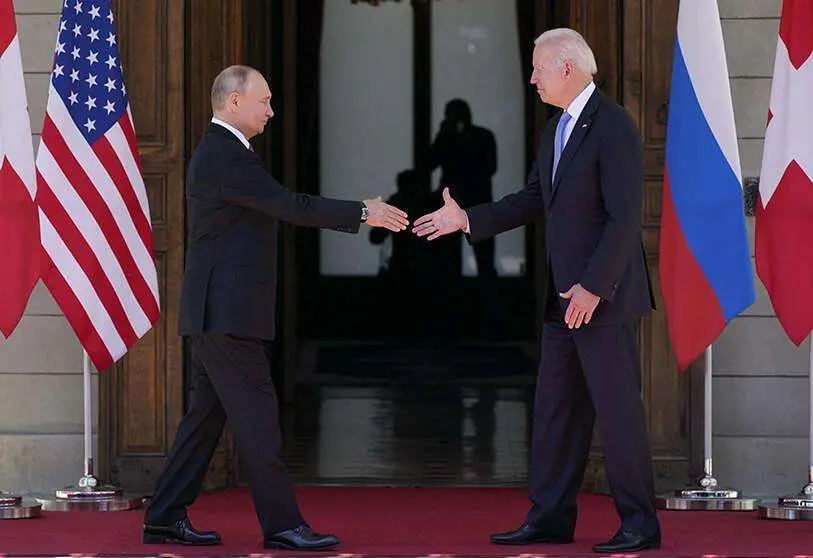Biden and Putin

Putin does not like Biden and interfered in the last election to favour Donald Trump, and Biden does not like Putin either because he thinks he is a man "without a soul", as he told him to his face in 2011. Last June they met in Geneva with no reason to change each other's opinion of the other, and because of this and the differences that separate them, not much could be expected from the meeting. Those low expectations were more than met.
It was in Putin's interest to meet with Biden because the sanctions (American and European) after annexing Crimea are hurting his ailing economy. He knows that no one will lift them (at least for now) but he would consider it a triumph if he managed to soften them to some extent. Not to mention that for a nationalist leader like Putin the mere fact of meeting bilaterally, face to face, on the same level, with the president of the most powerful country in the world was already a success. Putin considers the demise of the Union of Soviet Socialist Republics, which downgraded Russia's international status to that of a second-rate power, a tragedy, and Obama's comment that Russia is merely a "regional power" was a firebrand for him. He has not forgiven himself for this and therefore values highly these bilateral summits that allow the world to see him as he sees himself, on the same level as Biden.
For his part, what really worries Biden is the rise of China, a country whose economy will soon overtake that of the US, which is investing a lot of money in armaments (its defence budget of 250 billion dollars is still far from the US budget of 760 billion, while Russia's is a modest 60 billion), which defends its own interests, and which is a country with an economy that will soon overtake that of the US. 60 billion), which defends an alternative authoritarian model of global governance that is widely accepted among third world countries, which uses questionable commercial and monetary practices, which threatens undisguised expansionism towards the South China Sea and the Republic of Taiwan itself, about which Xi has just made statements that leave no room for doubt as to his final intentions, and which has just made statements that leave no room for doubt as to his final intentions, and which has just made statements that leave no room for doubt as to his final intentions.
In this context, a rapprochement with Russia would not only leave Biden's hands freer with China but would also reassure Europeans and might encourage them to adopt a tougher stance towards Beijing and its violations of trade practices and human rights.
All this being true, it should not be forgotten that Biden is a man of the old school who grew up and was politically trained in times of communism, cold war and 'mutually assured destruction' and who harbours undisguised animosity for Russia. Unlike Obama, he does not talk of resetting the counter with Moscow, but neither does he want to risk escalation. There are several disputes between the two countries: the annexation of Crimea and the destabilisation of Ukraine, interference in US elections, parallel Russian accusations of American interference in their domestic affairs, human rights (Navalny), reciprocal expulsions of diplomats and the closure of consulates, the Kremlin's support for the Belarusian dictator who diverts planes to detain political opponents or pushes refugees into neighbouring countries, telematic interference and cyber-terrorism, and a long etcetera without forgetting Moscow's continuous efforts in the world not only to discredit the Americans and their policies but also to drive a wedge into the relationship between Brussels and Washington.
Despite these obvious differences, there is one thing both agree on that is in the interests of both the US and Russia, and that is the desirability of bringing a certain stability and predictability to their bilateral relationship in order to avoid any surprises. As far as possible. Because both know that it is unwise to play with fire, and they also know that there are issues on which they must come to an understanding for their mutual and general benefit, for example on disarmament. Once a five-year extension of the START Treaty on strategic missile reduction has been agreed, further reductions of the respective arsenals can be discussed, as well as how to incorporate China into the disarmament effort, which will not be easy, or other disarmament treaties recently denounced by one or the other, such as the INF on medium-range missiles in Europe or the Open Skies Treaty. Disarmament is the most obvious area of possible mutually beneficial collaboration. So are climate or the fight against pandemics, where the urgency is great (in Russia the death toll has been rising sharply in recent weeks) and the scope for cooperation is vast. They could also work together on nuclear proliferation issues such as those raised by Iran and North Korea and it is a pity that the Russians have just decided to close their embassy to NATO, citing grievances, because it offered an excellent framework for dealing with all these issues in a more diluted context.
For the reality is that even if Russia no longer plays in the Champions League, it is still a good team to respect, and if there is one thing Washington is more worried about than China, it is the possibility that Moscow and Beijing might get closer and do a "Nixon" on it, reminiscent of what Nixon and Kissinger together with Mao and Chu En-lai did to Brezhnev in 1972, which left him very "unsettled". And lately China and Russia are slowly but surely moving closer together. In the Americans' favour is Putin's nationalist character, who will find it difficult to accept being the junior partner in this eventual - but by no means ruled out - alliance.
Jorge Dezcallar Ambassador of Spain.

